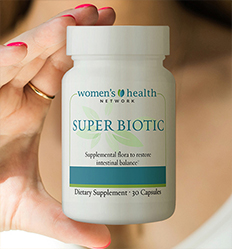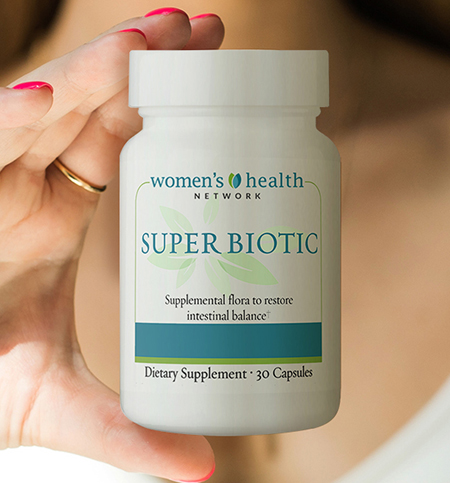Authored by Dr. Mary James, ND
You may be seeing a lot of news about the power and benefits of probiotics. More and more people (and the media) are focusing on probiotics for reducing digestive problems — like indigestion, diarrhea or constipation, reflux, or gas and bloating. Maintaining the proper balance of bacteria by taking probiotics can help reduce or eliminate troubling digestive symptoms. These microorganisms — trillions of them — make vitamins, help you digest, regulate your bowels and support your immune system.

Probiotics help many GI issues:
- Acute diarrheal infections
- Antibiotic-induced diarrhea
- Irritable bowel syndrome
- Lactose intolerance
- Chronic constipation
- Nutrient malabsorption
- Clostridium difficile colitis
- Helicobacter pylori infection
- Inflammatory bowel disease
But even bigger news — and most exciting to me as a functional medicine practitioner — is the rapidly growing body of research into probiotics and their powerful benefits for health outside of the gastrointestinal system. More and more, this research is showing how we can support the microorganisms that have far-reaching systemic effects we might have never thought possible.
Here are just a few of the new benefits of probiotics — in addition to the gastrointestinal issues — that can help resolve your symptoms and keep you healthier over time.
3 new benefits of probiotics
1. Probiotics and weight loss
The latest research shows that probiotics may help you lose weight — up to twice as much according to one study. While we’ve known for a while that during weight loss there are changes in intestinal bacterial composition, a recent study focused on the possibility that certain bacteria caused weight loss. Researchers found a group of overweight adults taking a probiotic lost twice as much weight as the non-probiotic group. The 24-week study followed 125 overweight people as they dieted for 12 weeks and then followed a 12-week maintenance diet.
2. Probiotics and improved mood
Our gut bacteria is connected to how our brain works — specifically to how we react emotionally to specific stimuli. In the first study of its kind, 45 healthy women took no product, a non-fermented dairy product (placebo) or a probiotic dairy product. Over four weeks they were randomly shown pictures of negative emotional faces while their brain activity was monitored. Compared to the other groups, women receiving probiotics showed significantly less emotional arousal during the experiment. Another small study showed a probiotic formula containing Lactobacillus helveticus and Bifidobacterium longum to reduce psychological distress in test subjects.
Friendly bacteria support our health by…
- Producing digestive enzymes
- Making vitamins (B1, B2, B6, B12 and K)
- Enhancing vitamin and mineral absorption
- Breaking down harmful dietary toxins
- Neutralizing potential carcinogens (e.g., nitrites)
- Preventing colonization by potential pathogens
- Maintaining a strong intestinal barrier
- Helping us digest fats
3. Benefits of probiotics on allergy prevention
Have you noticed that problems with common foods like nuts or corn are becoming more common? Gut flora imbalances may contribute to the development of allergic hypersensitivities to foods that are normally tolerated.
You may not realize that each day as you eat, your body must deal with a huge load of foreign material — an astonishing 25 tons of food over the course of your life. Intestinal microbiota (or gut flora), along with the immune system, help sort out which foreign substances are friend vs. foe, especially in the very early stages of life. Poor digestion and/or microbial imbalance can throw a wrench into this process, leading to hypersensitivities or allergies.
What’s more, up to 50% of people with food sensitivities may suffer from leaky gut — a problem that can be helped by probiotics. Disrupted gut microbiota is a major cause of leaky gut, which then allows toxins and incompletely digested food molecules to slip past the intestine and trigger inflammation.
Should you take probiotics?
The short answer is most likely yes. The natural bacteria in your digestive system can easily be thrown out of balance by factors such as stress, a junk-food diet and antibiotics, which don’t just knock out the bad bugs, they also knock out those essential to our health. Think twice before asking your doctor for antibiotics, especially if your symptoms appear viral rather than bacterial (your healthcare practitioner can help you determine this).
A probiotic supplement increases beneficial microorganisms in your system — especially important if you eat lots of refined carbs, experience chronic stress, have had more than a few courses of antibiotics, have digestive problems/bowel symptoms or have food sensitivities.
Considering the amount of antibiotic-tainted meats and poultry these days, most of us are probably better off taking a probiotic regularly and avoiding animal products that are not antibiotic-free. Sadly, common herbicides like Roundup® have also been observed to compromise gut flora.
Keep in mind that probiotics are also found in fermented foods like yogurt (live-culture, not the cheap stuff), kefir, kombucha, tempeh, sauerkraut and kim chee. Try to regularly include naturally fermented foods in your diet, while minimizing your intake of sweets and simple carbohydrates.
Embrace probiotics!
I realize that you may not want to think too much about the bugs in your intestines. But it’s high time you made peace with these microbes! They deserve your support, and in doing so, you’ll be taking an important step to feeling better.
Jumpertz R, Le DS, Turnbaugh PJ, et al. Energy-balance studies reveal associations between gut microbes, caloric load, and nutrient absorption in humans. Am J Clin Nutr. 2011 Jul;94(1):58-65.
Sanchez M, Darimont C, Drapeau V, et al. Effect of Lactobacillus rhamnosus CGMCC1.3724 supplementation on weight loss and maintenance in obese men and women. Br J Nutr. 2014 Apr 28;111(8):1507-1519.
Tillisch K, Labus J, Kilpatrick L, et al. Consumption of fermented milk product with probiotic modulates brain activity. Gastroenterology. 2013 Jun;144(7):1394-1401.
Messaoudi M, Lalonde R, Violle N, et al. Assessment of psychotropic-like properties of a probiotic formulation (Lactobacillus helveticus R0052 and Bifidobacterium longum R0175) in rats and human subjects. Br J Nutr. 2011 Mar;105(5):755-764.
Molloy J, Allen K, Collier F, et al. The potential link between gut microbiota and IgE-mediated food allergy in early life. Int J Environ Res Public Health. 2013 Dec 16;10(12):7235-7256.
Sampson HA. Food hypersensitivity: manifestations, diagnosis, and natural history. Food Tech. 1992;May:141-144.
Bjarnason I, MacPherson A, Hollander D. Intestinal permeability: an overview. Gastroenterology. 1995 May;108(5):1566-1581.
Resta-Lenert SC, Barrett KE. Modulation of intestinal barrier properties by probiotics: role in reversing colitis. Ann N Y Acad Sci. 2009 May;1165:175-182.
Ji S. How GMO Farming and Food is Making Our Gut Flora Unfriendly. March 28, 2013. GreenMedInfo. Available at: https://www.greenmedinfo.com/how-gmo-farming-and-food-making-our-gut-flora-unfriendly. Accessed February 18, 2015.












